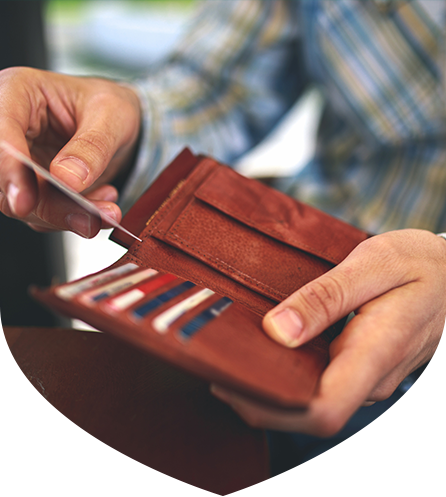Financial Wellness
Think Twice Before Storing Money in Payment Apps
As digital payment methods become more popular, it's important to understand the risks of storing money in apps like Venmo or Cash App. While these services are convenient, there are several reasons why you might want to avoid keeping funds in them long-term.
One major appeal of payment apps is the privacy they offer. You can quickly split a bill or pay someone back without sharing sensitive details like your phone number. This feature is particularly handy for one-time transactions, such as paying for a meal after a first date that didn't quite click.
While these apps offer convenience, it's smart to avoid storing money in them for extended periods.
Storing funds in these apps long-term can be risky, and you'll miss out on potential interest earnings from a savings account. It's smart to transfer incoming payments to your credit union account immediately rather than allowing money to accumulate in the app.
While your balance sits idle in payment apps, some companies invest these funds in loans and bonds, profiting from your money. Even if you work in cash-heavy industries like bartending, it's worth finding a secure place to deposit your earnings where your money can grow. As one user put it, "With Venmo, I transfer my payments out as soon as I get them."
Lack of Deposit Insurance
While it may seem convenient to keep money in your payment app for future transactions, the Consumer Financial Protection Bureau (CFPB) Director Rohit Chopra notes, "Popular digital payment apps are increasingly used as substitutes for a traditional bank account, but they don't offer the same protections to ensure funds are safe."
Unlike traditional banks and credit unions, most payment apps don't offer FDIC or NCUA insurance for stored funds. This means if the app goes bankrupt or faces financial trouble, your money may not be protected.
Some payment apps are addressing these concerns. For example, Cash App and PayPal now offer separate high-yield, FDIC-insured savings products. However, these products are different from the main balances used for transactions.
Limited Access to Funds
Transferring money from a payment app to your bank or credit union can take several days, which could be problematic if you need quick access to your funds. Some apps offer instant transfers but charge additional fees.
Transaction Errors/Recoverability
Mistakes, like sending money to the wrong person or entering the wrong amount using a peer-to-peer (P2P) payment app, can be more difficult to fix than transactions with traditional financial institutions.
Security Vulnerabilities
Payment apps can be targets for hackers. While they use security measures, they're not immune to breaches that could put your financial information and funds at risk. If you do store money in the app, limit the amount you keep, reducing the risk of fraud.
Privacy Concerns
Payment apps often collect extensive data on your spending habits and personal information, which could be used for targeted ads or shared with third parties.
Lack of Transparency
Many payment apps have vague user agreements that don't specify where funds are stored or how they're invested. This lack of transparency can put your money at risk.
Limited Regulatory Oversight
Payment apps often fall into regulatory "gray areas" and don't have the same level of oversight as traditional financial institutions. This can make it harder to resolve issues or disputes.
Limited Service
Keep in mind that your credit union provides comprehensive assistance, with various ways to reach out if there's an issue:
This information is provided for educational purposes only. For financial advice, consult a professional for personalized guidance related to your specific situation.
The Popularity of Payment Apps
Payment apps have exploded in popularity in recent years. In 2022, these apps processed an estimated $893 billion in transactions, and projections suggest that the figure could reach $1.6 trillion by 2027. A 2022 Pew Research Center survey found that over 75% of U.S. adults have used at least one payment app, with adoption rates soaring to 85% of 18-29-year-olds using services like PayPal, Venmo, or Zelle.One major appeal of payment apps is the privacy they offer. You can quickly split a bill or pay someone back without sharing sensitive details like your phone number. This feature is particularly handy for one-time transactions, such as paying for a meal after a first date that didn't quite click.
While these apps offer convenience, it's smart to avoid storing money in them for extended periods.
Key Considerations for Payment Apps
Missing Out on InterestStoring funds in these apps long-term can be risky, and you'll miss out on potential interest earnings from a savings account. It's smart to transfer incoming payments to your credit union account immediately rather than allowing money to accumulate in the app.
While your balance sits idle in payment apps, some companies invest these funds in loans and bonds, profiting from your money. Even if you work in cash-heavy industries like bartending, it's worth finding a secure place to deposit your earnings where your money can grow. As one user put it, "With Venmo, I transfer my payments out as soon as I get them."
Lack of Deposit Insurance
While it may seem convenient to keep money in your payment app for future transactions, the Consumer Financial Protection Bureau (CFPB) Director Rohit Chopra notes, "Popular digital payment apps are increasingly used as substitutes for a traditional bank account, but they don't offer the same protections to ensure funds are safe."
Unlike traditional banks and credit unions, most payment apps don't offer FDIC or NCUA insurance for stored funds. This means if the app goes bankrupt or faces financial trouble, your money may not be protected.
Some payment apps are addressing these concerns. For example, Cash App and PayPal now offer separate high-yield, FDIC-insured savings products. However, these products are different from the main balances used for transactions.
Limited Access to Funds
Transferring money from a payment app to your bank or credit union can take several days, which could be problematic if you need quick access to your funds. Some apps offer instant transfers but charge additional fees.
Transaction Errors/Recoverability
Mistakes, like sending money to the wrong person or entering the wrong amount using a peer-to-peer (P2P) payment app, can be more difficult to fix than transactions with traditional financial institutions.
Security Vulnerabilities
Payment apps can be targets for hackers. While they use security measures, they're not immune to breaches that could put your financial information and funds at risk. If you do store money in the app, limit the amount you keep, reducing the risk of fraud.
Privacy Concerns
Payment apps often collect extensive data on your spending habits and personal information, which could be used for targeted ads or shared with third parties.
Lack of Transparency
Many payment apps have vague user agreements that don't specify where funds are stored or how they're invested. This lack of transparency can put your money at risk.
Limited Regulatory Oversight
Payment apps often fall into regulatory "gray areas" and don't have the same level of oversight as traditional financial institutions. This can make it harder to resolve issues or disputes.
Limited Service
Keep in mind that your credit union provides comprehensive assistance, with various ways to reach out if there's an issue:
- Phone Support: For urgent matters like reporting lost or stolen cards.
- Online Chat: Live chat option on our website or mobile app for quick queries.
- Email: For non-urgent matters, you can send emails to dedicated support.
- In-Person Support: Unlike payment apps, you have access to physical branches where you can get face-to-face assistance.
Conclusion
There's no denying the convenience and popularity of payment apps. As the Financial Technology Association points out, "Tens of millions of Americans use payment apps daily to send money to friends and family, pay bills, and manage their finances." However, it's essential to use these apps wisely and be aware of their limitations.This information is provided for educational purposes only. For financial advice, consult a professional for personalized guidance related to your specific situation.
Resources: The Associated Press, TIME USA, LLC.


